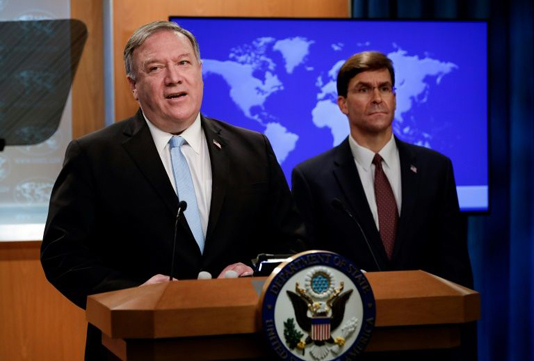WASHINGTON, Oct 25, 2020 (BSS/AFP) – When the United States tried to
seal a defense deal seven years ago with the Maldives, a sprawling and
strategic archipelago, its plans were quietly torpedoed by a friend —
India, which considers the Indian Ocean its sphere of influence.
US Secretary of State Mike Pompeo will visit the Maldives this week
after top-level talks in India — which offered open support when the
Pentagon finally went ahead with a defense pact with the island nation
in September.
What brought about the change, analysts say, is a deepening concern
in New Delhi about China, which engaged in a deadly border clash with
India this year and has been ramping up influence around South Asia,
including in the Maldives.
Pompeo will also visit Sri Lanka — where China has lent billions
of dollars, leaving a mountain of debt — as well as Indonesia, as
President Donald Trump’s administration steps up its challenges to
Beijing’s maritime claims in the dispute-rife South China Sea.
Pompeo, who has championed a hard line on Beijing, said his trip
will “include discussions on how free nations can work together to
thwart threats posed by the Chinese Communist Party.”
– Moving ‘needle’ from China –
Pompeo will be the first US secretary of state since 2004 to visit
the Maldives, which under the defense accord agreed to strengthen
cooperation with the United States and support a “free and open
Indo-Pacific.”
“At another time, India might have complained about the US presence
in the Indian Ocean. Today, it doesn’t want the US to leave,” said
Tanvi Madan, director of The India Project at the Brookings
Institution.
New Delhi has come around to seeing greater US involvement in
India’s backyard as offering a better alternative to China, she said.
“India recognizes that it can’t do it alone, either because of
capacity issues or because it has baggage with the countries that
affects what they would be willing to do with India versus, say, Japan
or the US.”
Sri Lanka’s populist president, Gotabaya Rajapaksa, has embraced
support from China but will likely want to “play the game” of being
courted by different powers, said Aparna Pande, director of the Hudson
Institute’s Initiative on the Future of India and South Asia.
She doubted Sri Lanka would go the route of India’s historic rival
Pakistan, which has forged tight relations with China.
New Delhi believes that if the United States gets more involved in
Sri Lanka, “the needle will come a little closer to the US-India side
than the China side,” Pande said.
– Priority even during election –
Pompeo will be joined by Defense Secretary Mark Esper in New Delhi
on Monday and Tuesday for annual talks.
Officials said the two countries are expected to sign an agreement
on sharing geospatial intelligence, paving the way for the United
States to ship increasingly sophisticated missile technology.
The United States has sold India more than $20 billion in weapons
since the world’s two largest democracies began to scale up relations
in the 2000s but New Delhi has also turned to historic partner Russia
as well as France and Israel as it modernizes its military.
The “two-plus-two” dialogue, delayed because of the Covid-19
pandemic that has ravaged both India and the United States, comes one
week before US elections in which Trump is trailing Democrat Joe Biden
in polls.
Pande said the timing showed India that the United States placed a
high priority on the relationship — and she doubted there would be
significant changes under Biden.
“I think Delhi is one of the few capitals which is not very
worried” about swings in policy depending on the election, Pande said.
As US relations deteriorate with China, “which country would you
want on your side — one which borders China, is antagonistic to
China, has lost territory to China and has the potential to become a
rival to China. That’s India.”
India has banned Chinese apps including TikTok but has voiced hope
for stable relations with Beijing, even after 20 Indian troops and an
unknown number of Chinese soldiers died in the June clash in the
Himalayas.
When Indian officials hear the Trump administration, “I do think
they would prefer it not to be so in-your-face at times, because they
do take a subtler approach,” Madan said.
But she added: “They are very aware that there is a more
competitive American view that converges with much of their view of
China.”



